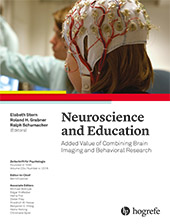Event-Related Potentials (ERPs) Reflecting Feedback and Error Processing in the Context of Education
Abstract
Abstract. Feedback allows individuals to detect errors and to adapt subsequent behavior in order to ensure goal achievement. As such, feedback provides rich and essential information for human learning. Consequently, feedback is of great importance for education and has been extensively studied by educational researchers (see Dion & Restrepo, 2016). One way to examine feedback and error processing is by means of event-related potentials (ERPs) in the human electroencephalography (EEG). The aim of this commentary is to portray two ERPs which have been directly linked to feedback and error processing in the human brain, namely the feedback-related negativity (FRN) and the error-related negativity (ERN). Firstly, the core empirical findings regarding the FRN/ERN are described, followed by a brief outline of two theories accounting for both ERPs. Finally, the potential of the FRN/ERN in advancing our understanding of feedback and error processing in the context of learning and instruction is discussed.
References
(2016). Error-related brain activity and error awareness in an error classification paradigm. NeuroImage, 139, 202–210. doi: 10.1016/j.neuroimage.2016.05.074
(2016). A systematic review of the literature linking neural correlates of feedback processing to learning. Zeitschrift für Psychologie, 224, 247–256. doi: 10.1027/2151-2604/a000260
(1974). Effects of noise letters upon identification of a target letter in a non-search task. Perception & Psychophysics, 16, 143–149.
(2012). Feedback-related brain activity predicts learning from feedback in multiple-choice testing. Cognitive, Affective, & Behavioral Neuroscience, 12, 323–336. doi: 10.3758/s13415-012-0087-9
(1991). Effects of crossmodal divided attention on late ERP components. II. Error processing in choice reaction tasks. Electroencephalography and Clinical Neurophysiology, 78, 447–455.
(1993). A neural system for error detection and compensation. Psychological Science, 4, 385–390. doi: 10.1111/j.1467-9280.1993.tb00586.x
(2012).
The error-related negativity (ERN/Ne) . In S. J. LuckE. S. KappenmannEds., The Oxford handbook of event-related potential components (5th ed.). New York, NY: Oxford University Press.(2002). The neural basis of human error processing: Reinforcement learning, dopamine, and the error-related negativity. Psychological Review, 109, 679–709. doi: 10.1037/0033-295X.109.4.679
(2014). Learning from feedback: The neural mechanisms of feedback processing facilitating better performance. Behavioural Brain Research, 261, 356–368. doi: 10.1016/j.bbr.2013.12.043
(2012). Emotion blocks the path to learning under stereotype threat. Social Cognitive and Affective Neuroscience, 7, 230–241. doi: 10.1093/scan/nsq100
(1997). Event-related brain potentials following incorrect feedback in a time-estimation task: Evidence for a “generic” neural system for error detection. Journal of Cognitive Neuroscience, 9, 788–798. doi: 10.1162/jocn.1997.9.6.788
(2003). Error negativity on correct trials: A reexamination of available data. Biological Psychology, 64, 265–282. doi: 10.1016/S0301-0511(03)00097-8



